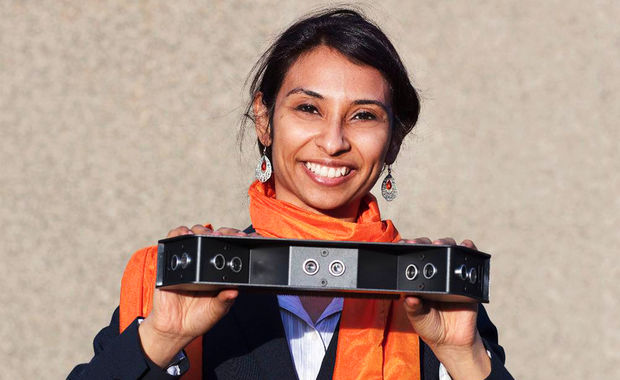Sponsored by:
How Can Canada Keep up with an Aging Population?
Research and Innovations By mounting an object detecting device on a wheelchair, getting around becomes easier and safer.

Wade Watts has used a wheelchair ever since an accident left him unable to walk, followed by a diagnosis of the rarest form of multiple sclerosis, a condition that had gone undiagnosed for 25 years.
Something that makes a big difference in Watts’ life is a device mounted on his wheelchair that detects obstacles, making it safer to get around. “To have a device that is literally watching my back is an amazing feeling,” says Watts, who lives in Quinte West, ON.

An innovative approach to collaboration
Developed by Braze Mobility Inc., it’s one of many innovations supported by AGE-WELL, a pan-Canadian network of more than 200 researchers and over 250 industry, government, and non-profit partners working collaboratively to provide older adults and caregivers with technologies and services to improve quality of life and offer independence while aging gracefully. More than 4,500 older adults and caregivers are involved in the network.
“We have a broad mandate designed to respond to the pressing challenges of an aging population and to seize the opportunity that technology offers,” says Dr. Alex Mihailidis, Scientific Co-Director and CEO of AGE-WELL, Canada’s Technology and Aging Network. “We’re the only organization of its kind in Canada that makes an investment in technology-based solutions for older adults across the entire spectrum of the innovation pipeline — from a great idea to a commercialized product, always with an eye to solving real-world challenges.”
With 40 member universities and research centres, AGE-WELL supports teams across the country that are developing over 70 products to increase safety and security, support independent living, and enhance social participation. These include technologies, services, and policies that help get AGE-WELL’s solutions to people who need them. One team is testing special “compliant” flooring designed to reduce injuries from falls. Another is perfecting a wearable device that shows caregivers how to protect their backs. There’s a smart bed that uses pressure-sensor technology to help predict and prevent health issues by monitoring movement, breathing and fluid retention. The list goes on.

Looking at the future of healthy aging
Through AGE-WELL’s support, industry partners and start-ups are able to accelerate the delivery of technology-based solutions that support healthy aging. Products like the obstacle-detection system used by Watts are currently available on the market, as is a communications platform that connects seniors with family members and friends to help reduce isolation and loneliness, and a wall-mounted interactive system meant to engage people with dementia who live in long-term care.
“The focus is on practical solutions that help people in everyday life and bring social and economic benefits for Canadians,” says Dr. Mihailidis, noting that consumers are deeply involved in the research, along with industry and community partners. “This is how we ensure our products are useful.” AGE-WELL also addresses ethical, privacy and regulatory issues associated with new technologies, and trains the next generation of leaders in the field.
As the number of aging adults continues to grow — Statistics Canada’s 2016 census shows that, for the first time, seniors outnumber children in this country — the goal is to help older adults stay healthy and independent in their own homes, and assist those living with disease and disability, through innovative technologies. With its smart-home systems, remote therapies and socially-assistive robots, AGE-WELL is making Canada a leader in the technology and aging sector, enhancing quality of life for current and future generations and easing pressures on the health-care system.
“Canada’s shifting demographics mean we need to keep up with this demand,” says Dr. Mihailidis. “We’re all on this trajectory because we’re all aging. It’s an area of development that touches everyone.”
Launched in 2015, AGE-WELL is a federally-funded Network of Centres of Excellence.

